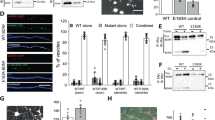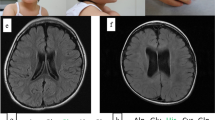Abstract
An 8-year-old male with a complex developmental syndrome and severe obesity was heterozygous for a de novo missense mutation resulting in a Y722C substitution in the neurotrophin receptor TrkB. This mutation markedly impaired receptor autophosphorylation and signaling to MAP kinase. Mutation of NTRK2, which encodes TrkB, seems to result in a unique human syndrome of hyperphagic obesity. The associated impairment in memory, learning and nociception seen in the proband reflects the crucial role of TrkB in the human nervous system.
This is a preview of subscription content, access via your institution
Access options
Subscribe to this journal
Receive 12 print issues and online access
$209.00 per year
only $17.42 per issue
Buy this article
- Purchase on Springer Link
- Instant access to full article PDF
Prices may be subject to local taxes which are calculated during checkout


Similar content being viewed by others
References
Kernie, S.G., Liebl, D.J. & Parada, L.F. EMBO J. 19, 1290–1300 (2000).
Xu, B. et al. Nat. Neurosci. 6, 736–742 (2003).
Rios, M. et al. Mol. Endocrinol. 15, 1748–1757 (2001).
Huang, E.J. & Reichardt, L.F. Annu. Rev. Neurosci. 24, 677–736 (2001).
O'Rahilly, S., Farooqi, I.S., Yeo, G.S. & Challis, B.G. Endocrinology 144, 3757–3764 (2003).
Ultsch, M.H. et al. J. Mol. Biol. 290, 149–159 (1999).
Guiton, M., Gunn-Moore, F.J., Stitt, T.N., Yancopoulos, G.D. & Tavare, J.M. J. Biol. Chem. 269, 30370–30377 (1994).
McCarty, J.H. & Feinstein, S.C. Oncogene 16, 1691–1700 (1998).
Farooqi, I.S. et al. N. Engl. J. Med. 348, 1085–1095 (2003).
Erickson, J.T. et al. J. Neurosci. 16, 5361–5371 (1996).
Donovan, M.J. et al. Development 127, 4531–4540 (2000).
Elliot, C.D., Smith, P. & McCulloch, K. British Ability Scales II: Administration and Scoring Manual (NFER-Nelson Publishing Company Ltd, Windsor, UK, 1996).
Egan, M.F. et al. Cell 112, 257–269 (2003).
Klein, R. et al. Cell 75, 113–122 (1993).
Indo, Y. et al. Nat. Genet. 13, 485–488 (1996).
Acknowledgements
This work was supported by the Wellcome Trust (G.S.H.Y., I.S.F., J.R. and S.O.R.) and the Medical Research Council (J.G., J.K. and S.O.R.). We are indebted to the patients and their families for their participation and to the physicians involved in the Genetics of Obesity Study (GOOS).
Author information
Authors and Affiliations
Corresponding author
Ethics declarations
Competing interests
The authors declare no competing financial interests.
Rights and permissions
About this article
Cite this article
Yeo, G., Connie Hung, CC., Rochford, J. et al. A de novo mutation affecting human TrkB associated with severe obesity and developmental delay. Nat Neurosci 7, 1187–1189 (2004). https://doi.org/10.1038/nn1336
Received:
Accepted:
Published:
Issue Date:
DOI: https://doi.org/10.1038/nn1336
This article is cited by
-
The bi-directional association between bipolar disorder and obesity: Evidence from Meta and bioinformatics analysis
International Journal of Obesity (2023)
-
Alteration of BDNF, SPARC, FGF-21, and GDF-15 circulating levels after 1 year of anti-obesity treatments and their association with 1-year weight loss
Endocrine (2023)
-
Contribution of environmental, genetic and epigenetic factors to obesity-related metabolic syndrome
The Nucleus (2023)
-
Genomic diversity and signatures of selection in meat and fancy rabbit breeds based on high-density marker data
Genetics Selection Evolution (2022)
-
The genetics of obesity: from discovery to biology
Nature Reviews Genetics (2022)



